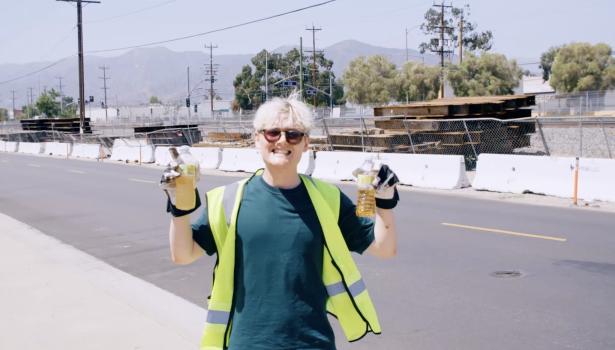The Great Amazon Heist, a special premiering tonight on Channel 4 in the United Kingdom, opens on the side of a road, outside of an Amazon fulfillment center in Los Angeles. Oobah Butler, host of Catfish UK and veteran prankster of the Nathan Fielder variety, is pointing at a water bottle full of yellow liquid.
“That’s a bottle of piss!” he shouts, only to do the same again and again in quick succession. In two minutes of scouting the roadside, he collects seven bottles of piss — he suspects one may be apple juice, but upon taking off the lid and sniffing it, he concludes that it, too, is piss.
Such is the start of a journey that takes the viewer through Amazon’s operations. In the course of the one-hour special, Butler works at a fulfillment center, sells a drink made of Amazon drivers’ pee on the company’s platform, has his very young nieces buy knives and rat poison through Alexa, and executes a complex scheme involving filling potholes around London with filler purchased on Amazon before then getting refunded for said filler by returning the packages loaded with sand.
That last one you’ll have to watch to fully understand, but the earlier segments are straightforward. First, Butler gets a job at BHX4, a fulfillment center in Coventry, England, that had then won close to majority support for unionizing. He does so because while he attends a walkout there, the first-ever at an Amazon warehouse in the UK, workers are too concerned about management retaliation to speak to him on camera. Naturally, the way around this problem is to become a worker himself.
Butler smuggles a camera through the fulfillment center’s extensive security checks and films what he sees. One of his coworkers tells him they aren’t allowed to sit down while on the clock, another that after eight months on the job, her back pain sometimes brings her to tears. Already on day one, his back starts hurting, his feet aching. On day two, he’s assigned to load a truck, and the fan inside of it doesn’t work, leaving Butler and his coworkers to sweat it out in boiling heat, even though they’d been told they’d be rotated out after half an hour.
Unbeknownst to Butler, according to the union, he is one of the hundreds of workers hired by Amazon to flood the bargaining unit so as to dilute support for the organizing effort. They succeed in doing so: shortly thereafter, the workers postpone the scheduled union vote. And despite donning a disguise — glasses, hair spray-painted black — Butler gets recognized within a few days, and with that, his time at Amazon comes to an end.
I appear in the film, too, as a source of information about the pervasive pissing-in-bottles problem endured by Amazon drivers, the subject of Butler’s next scheme: devising an energy drink composed of the pee he finds in bottles discarded by Amazon drivers and making it a bestseller on Amazon. For advice on gaming the algorithm, he calls up Moira Weigel, a professor at Northeastern University who has spent years researching the issues third-party sellers face on Amazon’s platform; she tells him that no one, maybe not even Amazon, understands exactly how to get the top spot on a product category.
He pulls the plan off with remarkable ease, naming the drink “Release Energy,” packaging it in a sleek yellow bottle, and engineering its rise to the top of Amazon’s “Bitter Lemon” category. In the process, Butler speaks with drivers who describe the need to pee in bottles as “degrading” but who feel they “have no other option.” A dispatcher for a delivery-service partner (DSP), the third-party companies Amazon employs to handle its delivery operations, even shows Butler how the monitoring system works on her phone, telling him, “If you pee in a bottle and leave it [in the vehicle], you will get a point for that” — meaning, a mark against you. (In a statement to Wired, Amazon denied that drivers are punished for leaving bottles of pee in their vehicles, and called Butler’s caper a “crude stunt.”)
And that’s just in the first half of The Great Amazon Heist. If Amazon’s poor working conditions are by now a well-tread subject, familiar to much of the public, the special nonetheless breaks new ground. There’s real journalistic value to the undercover stint, not to mention getting a DSP dispatcher to state that drivers are explicitly penalized for peeing in bottles. Plus, it’s not easy to make the topic of Amazon’s myriad wrongdoings funny, but leave it to Butler to pull it off, demonstrating that a company laser-focused on growth has very little time for quality control. Let’s hope he doesn’t get sued.
SHARE THIS ARTICLE
CONTRIBUTORS
Alex N. Press is a staff writer at Jacobin who covers labor organizing.
Our new issue, “Aging,” is out now. Follow this link for $20 introductory print subscriptions!


Spread the word